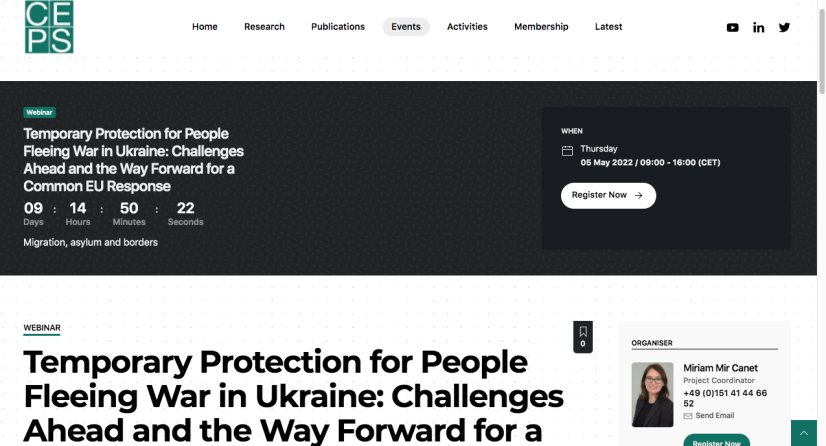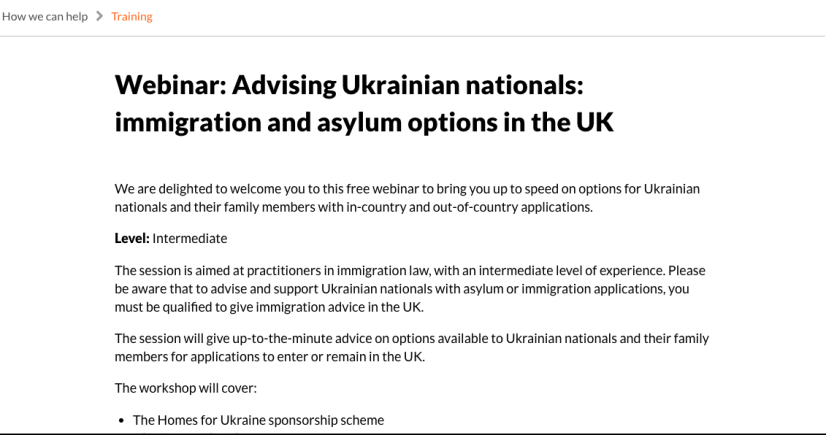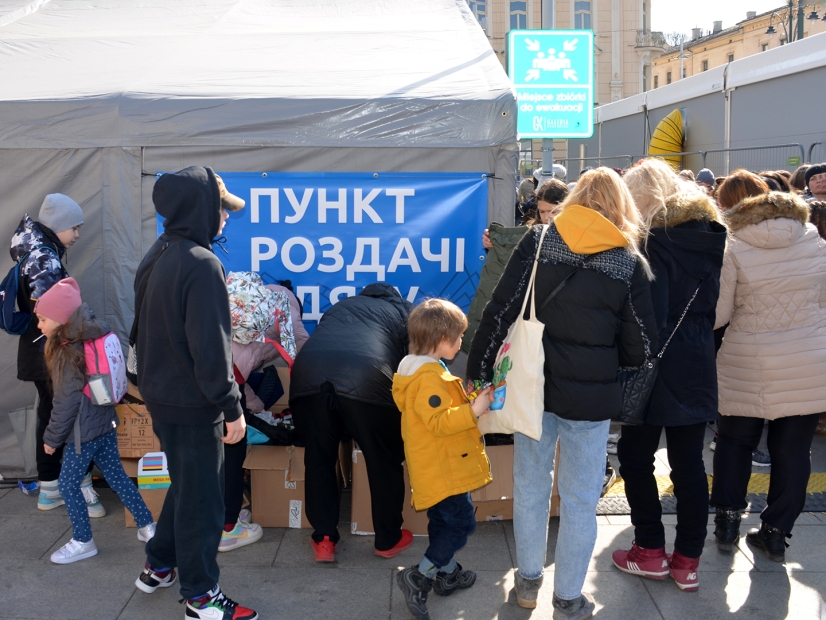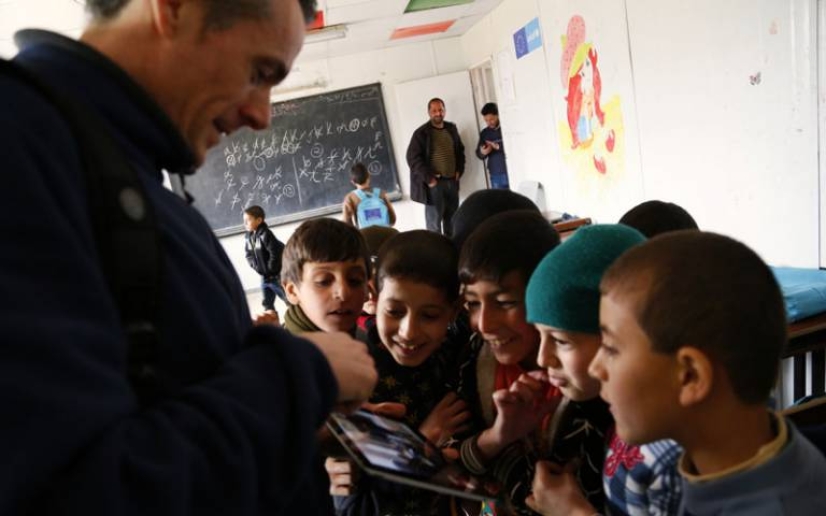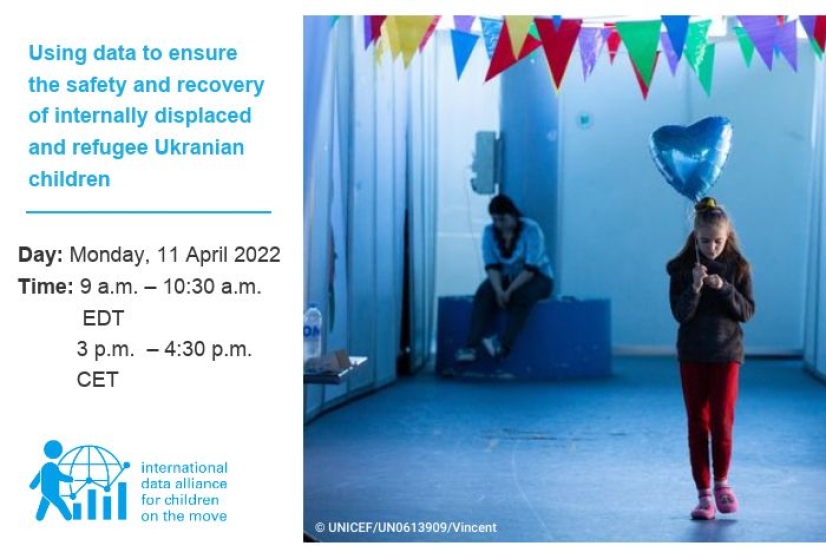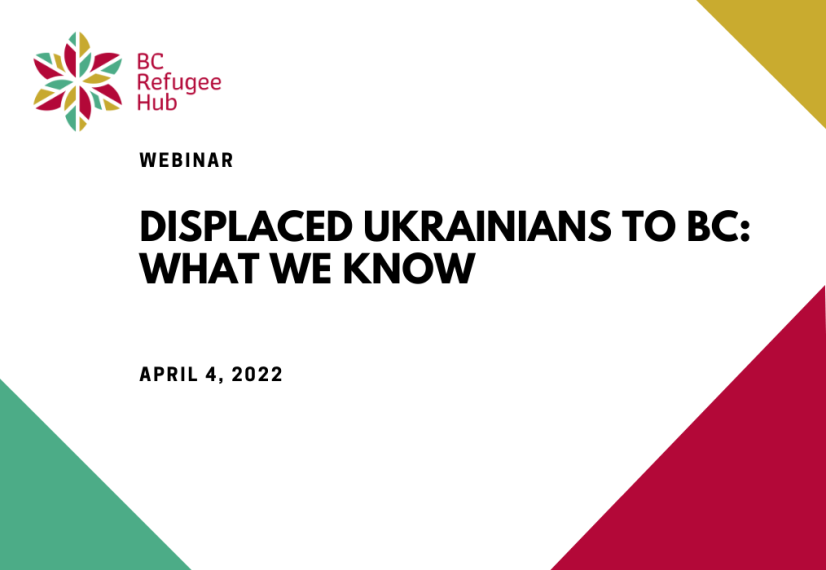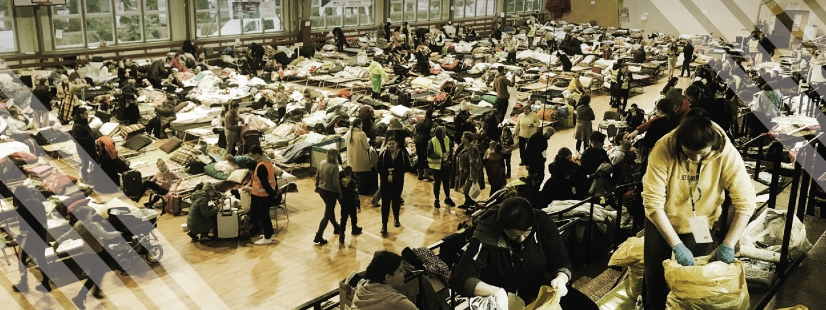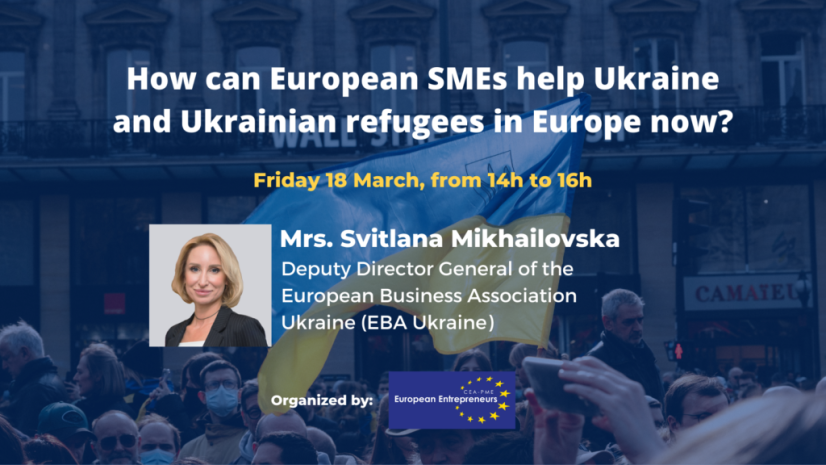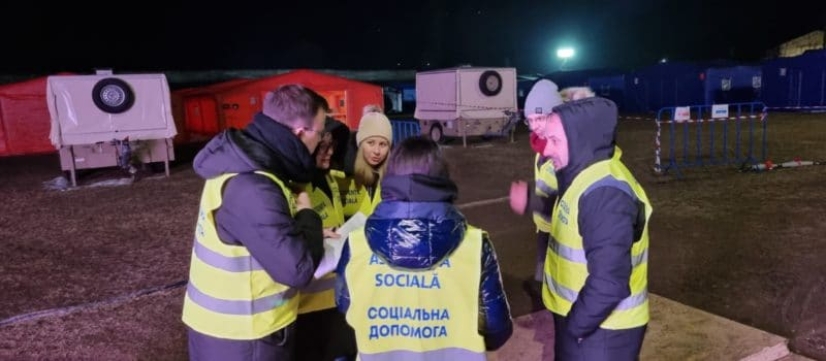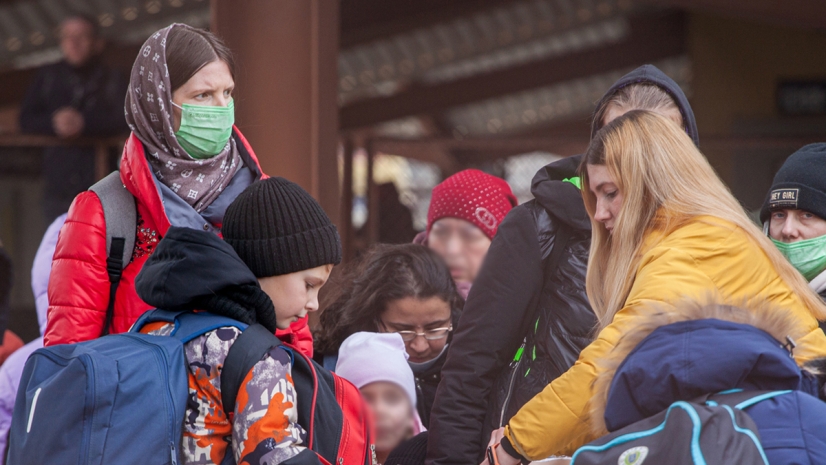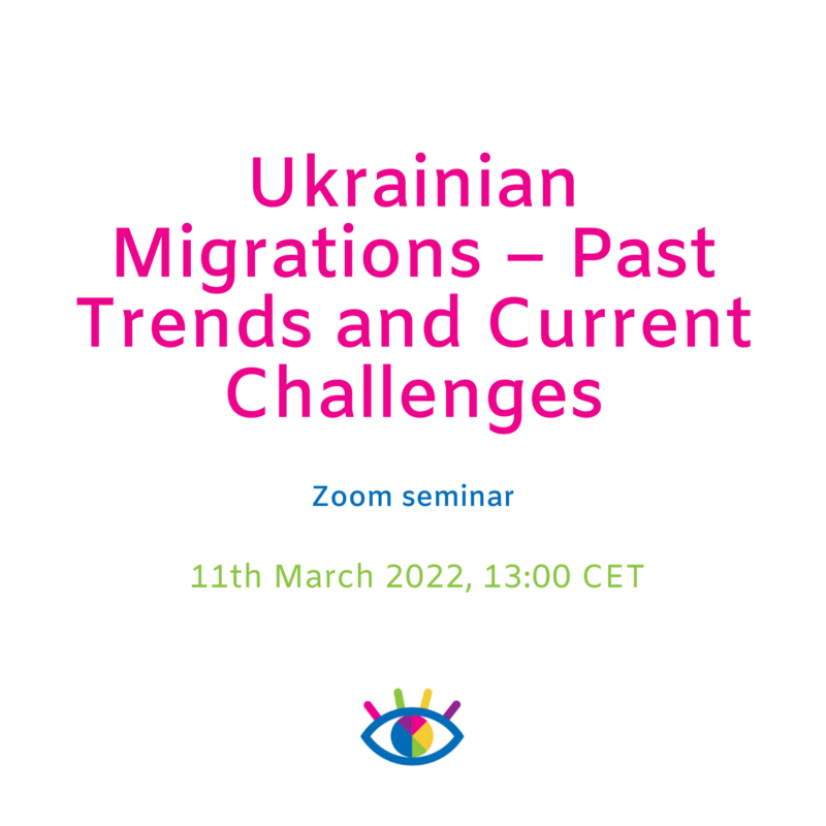
This section features past and future public events in regards to the situation in Ukraine and migration within and from the country. The external opinions expressed during events are those of the speakers and do not necessarily reflect the views of the International Organization for Migration (IOM), nor its Member States or other stakeholders.
Last updated on 20 February 2024
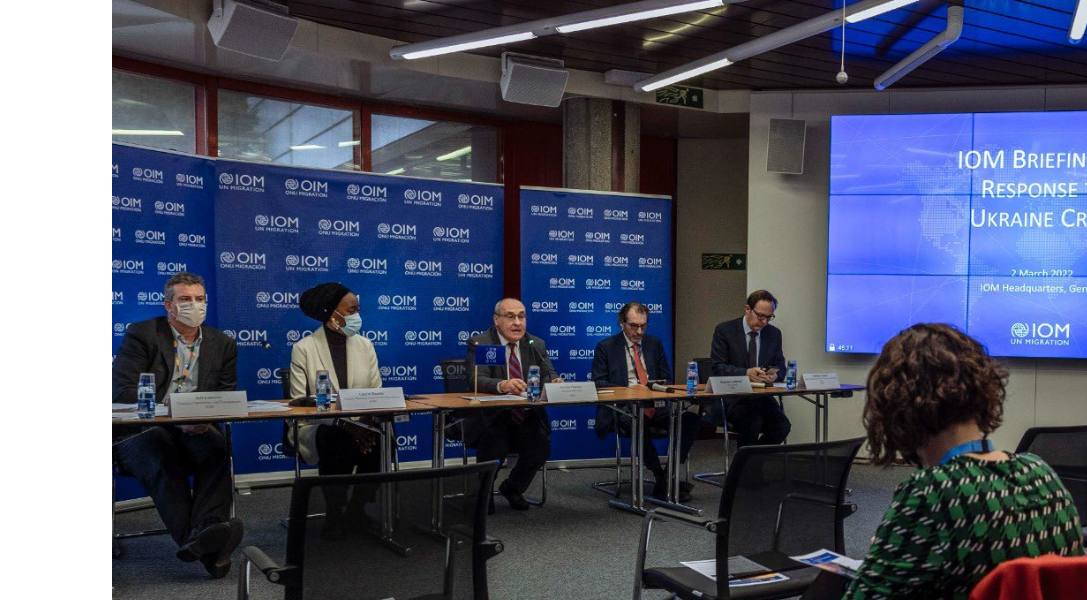
Upcoming Event
Ukraine Recovery Conference 2024
Organizer: Government of Ukraine and Government of Germany
Date: 11 - 12 June 2024
Location: Berlin, Germany
Upcoming Event
Conversations on Europe: The Russian war in Ukraine: Displaced People and Changing Security Concerns
Organizer: European Studies Center, a Jean Monnet European Union Center of Excellence at the University of Pittsburgh
Date: 12 March 2024, 12:30 - 02:00 pm, ET
Location: Online

About this event
For this 3rd Conversations of Europe this Spring 2024, join our experts for a discussion on "The Russian war in Ukraine: Displaced People and Changing Security Concerns."
Russia’s invasion of Ukraine transformed European security concerns dramatically. It has disrupted the lives of countless people in the region. It triggered a new wave of rapid forced migration throughout the EU and in other neighboring countries. Displacement from the war impacts not only Ukrainian women and children fleeing to Poland, Germany, Hungary, Moldova, and other neighboring countries. It has also affected Russians avoiding mobilization or Russian intellectuals avoiding repressions in their home country. Unfortunately, at a time of record numbers of internal and external displaced persons worldwide, the number of people seeking asylum has now risen in Central Asia and Caucasus. In addition to considering the overall security situation resulting from the war, this Conversation on Europe will ask: How do these movements of people affect the current situation in the EU and in receiving countries? How have societies and state apparatuses reacted to this migration, and what can we learn from these dynamics? What role does “security” and securitization play in these processes? Moderator: Randall Halle, University of Pittsburgh
Moderator: Randall Halle, Director, European Studies Center, University of Pittsburgh
Panelists: TBD
How to participate:
This event is free but you need to RSVP at calyc@fiu.edu and: click here
For any further information, please contact Christine I. Caly-Sanchez at calyc@fiu.edu
*******
Hosted by European Studies Center, a Jean Monnet European Union Center of Excellence at the University of Pittsburgh
Co-sponsors and participating centers: The Miami-Florida Jean Monnet Center of Excellence at Florida International University, the Center for European Studies at the University of Florida, the Center for European and Transatlantic Studies at Georgia Tech, and the European Union Center at the University of Illinois, Urbana-Champaign.
Co-funded by the Erasmus+ Programme of the European Union
Past Event
Policy Talk: ‘Looking into 2024: What migration-related developments to expect’
Organizer: Prague Process Secretariat at ICMPD
Date: 30 January 2024, 10:30 - 14:00 CET
Location: Online
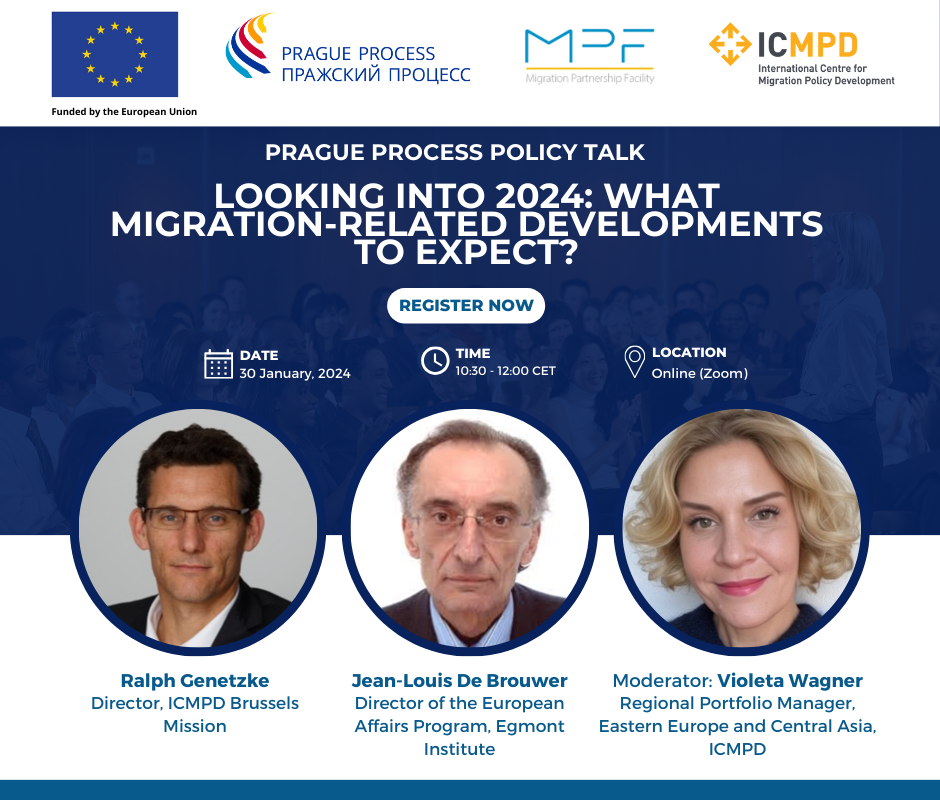
About this event
Sustaining the beginning-of-the-year tradition, Jean-Louis De Brouwer (Director, European Affairs Program, Egmont Institute) and Ralph Genetzke (Director, ICMPD Brussels Mission) will convene again to assess the main lessons and migration policy developments of 2023 and offer their insights for the year ahead in a discussion moderated by Violeta Wagner (Regional Portfolio Manager, Eastern Europe and Central Asia, ICMPD).
Against the backdrop of ongoing conflicts and crises across the EU’s neighbourhood, the European Council recently decided to open accession negotiations with Ukraine and Moldova and grant EU candidate status to Georgia, while also reaffirming its commitment to the EU membership perspective of the Western Balkan states and calling for an acceleration of their accession process. The two panellists will address this historic decision from a migration policy perspective.
Migration is also expected to play an important role in the run-up to the EU elections in mid-2024, which will largely determine the place that migration will occupy in the next strategic agenda 2024-2029, to be adopted by the European Council in June 2024. Following the political deal reached on the EU Pact on Asylum and Migration in the end of 2023, the panellists will also assess its future role and prospects, as well as remaining stumbling blocks, both in terms of internal cohesion and relations with partner countries.
The Policy Talk will further touch on the displacement of Ukrainians two years into Russia’s war of aggression, recent attempts of EU Member States to externalise asylum procedures and the need to boost legal migration channels to address ever increasing labour shortages.
How to participate:
Please register to the event through the link: https://us06web.zoom.us/webinar/register/WN_jegGQ5LwQs28f1mpRBMcLg#/registration. Once your registration is approved, you will receive the link to the virtual room. Should you not receive the confirmation email with the link, please contact the Prague Process Secretariat.
The Policy Talk will be held in English with simultaneous interpretation into Russian. The approximate duration will be 1,5 hours. The event is carried out via Zoom and can be accessed directly through your browser, following the link received. The discussion will be followed by a Q&A session. Kindly submit your questions (in English or Russian) during the event through the chat.
Past Event
Ukrainian Cities at the Forefront of the Response to the post-2022 Internal Displacement
Organizer: Laboratory of Urban and Regional Migration Policies; Migration Policies Research Unit of the Centre of Migration Research of the University of Warsaw (CMR UW) and the Union of Polish Metropolises
Date: 12 January 2024, 14:00-16:00 CET
Location: Online
About this event
This event is part of the CMR Migration & cities webinar series. It will feature five distinguished researchers and experts from Ukraine who will discuss the response of Ukrainian cities related to the arrival of internally displaced people (IDPs). The speakers will discuss the main needs, challenges, and ways to address them developed in the Ukrainian urban context. The webinar is aimed at the wider international community of researchers and practitioners. It will also facilitate networking with Ukrainian experts and create future cooperation opportunities.
Past Event
Multi-agency Donor Coordination Platform for Ukraine meets to discuss Ukraine’s budget needs for 2024, the Platform’s membership and Ukraine’s progress on reforms
Organizer: Steering Committee, Multi-agency Donor Coordination Platform for Ukraine
Date: 19 December 2023
Location: Online
About this event
On 19 December 2023, the Steering Committee of the Multi-agency Donor Coordination Platform for Ukraine met for the seventh time to discuss Ukraine’s budget needs for 2024, the extension of the Membership of the Platform and Ukraine’s progress on reforms, including with the preparation of the Ukraine Plan.
Ukraine’s Finance Minister Marchenko presented Ukraine’s 2024 budget needs, in particular in the first quarter of 2024, during which Ukraine will face challenges, which Prime Minister Schmyhal emphasized during his opening speech. Finance Minister Marchenko outlined the national measures already taken to address the situation. The International Monetary Fund updated the Platform Members on its programme, and Japan informed them about the latest discussions in the G7 finance track. Steering Committee members acknowledged the urgency, reiterated their commitment to supporting Ukraine, and discussed ways to help address Ukraine’s budgetary needs in early 2024, including by redeploying existing support, where possible.
The Steering Committee made significant progress on criteria for a possible expansion of the platform’s membership, which it expects to finalize shortly.
The Government of Ukraine presented the last developments in the preparation of the Ukraine Plan, a medium-term growth strategy for the country following four main goals, notably, to provide a coherent roadmap for Ukraine’s reforms and investments, boost growth potential, help rebuild and modernize, facilitate EU accession, and strengthen macro-financial stability. The Steering Committee members reiterated their commitment to coordinate on reforms under the Platform, with the view to achieving alignment and arriving at a consolidated list of reforms for the February Steering Committee meeting.
Following the historic decision taken by the European Council on 14 December to open accession negotiations with Ukraine, the Commission informed about the process going forward. The Commission updated the Steering Committee about next steps in relation to its proposal for the €50 billion Ukraine Facility.
The Steering Committee agreed on the importance of bringing private sector perspectives to the Platform, to further support Ukraine’s recovery and reconstruction. The Platform Secretariat will work with the members to bring it forward.
The Steering Committee will continue to meet regularly, with the next Steering Committee meeting foreseen in February.
Background
The Multi-agency Donor Coordination Platform for Ukraine was launched on 26 January 2023 with its inaugural Steering Committee meeting. It brings together high-level officials from Ukraine, the EU, the G7 countries, as well as partners from International Financial Institutions, notably the European Investment Bank, the European Bank for Reconstruction and Development, the International Monetary Fund and the World Bank, to coordinate efforts to address Ukraine’s financing needs, both in the short to medium-term.
The meeting was opened by Ukraine’s Prime Minister Schmyhal and the G7 Presidency and co-chaired by the European Commission Director-General for Neighbourhood and Enlargement Negotiations Gert Jan Koopman, together with the Deputy Prime Minister for Restoration of Ukraine and Minister for Communities, Territories and Infrastructure Development of Ukraine Oleksandr Kubrakov, and the Special Assistant to the President and Senior Director for International Economics Christina Segal Knowles. The First Deputy Prime Minister of Ukraine Yulia Svyrydenko and Minister of Finance of Ukraine Sergii Marchenko, and the US Special Representative for Ukraine’s Economic Recovery Penny Pritzker also participated.
For More Information
Past Event
Strengthening the Ukrainian higher education and research sector: the role of displaced Ukrainian researchers
Organizer: MSCA4Ukraine
Date: 19 September 2023, 14:00-15:00 CET
Location: Online
About this event
The presentation is now available.
The Russian Federation’s invasion of Ukraine prompted an immediate display of support by higher education and research institutions, governments and other organisations. As the war is now in its second year, with no end in sight, it is crucial to ensure a long-term approach, which goes beyond immediate help and emergency support. This approach should also consider the continuation and further development of the Ukrainian higher education and research sector, also with regard to its reconstruction and reform.
The MSCA4Ukraine fellowship scheme aims to allow Ukrainian researchers to continue their academic research in European host institutions. In addition, it aims to enable displaced Ukrainian researchers to maintain their connections to their home institutions and the research and innovation sector in Ukraine, strengthen collaboration between European and Ukrainian higher education institutions, and contribute to the strengthening of the Ukrainian university and research sector.
This webinar explored how displaced Ukrainian researchers across Europe can contribute to the strengthening of the Ukrainian higher education and research sector. It shared concrete cases of how MSCA4Ukraine fellows continue their academic work between their host and home institutions.
Past Event
Displaced from Ukraine to Berlin, Bern and Warsaw
Organizer: Mixed Migration Centre (MMC)
Date: 29 June 2023, 15:00-16:30 CET
Location: Online
About this event
The invasion of Ukraine by Russia on February 24, 2022 triggered a mass displacement crisis, which resulted in millions of people being internally displaced in Ukraine and seeking refuge in neighbouring countries in Europe (8,255,288 – UNHCR) and further afield, including over half a million in North America. The activation of the 2001 European Union (EU) Temporary Protection Directive (TPD) in March 2022 simplified the registration process across EU countries for Ukrainians and groups of non-EU nationals fleeing the conflict, granting them access to legal status, full services and rights while preventing asylum services in Europe from being overwhelmed. However, as the conflict continues, and with the risks of a protracted displacement crisis, concerns about the needs and vulnerabilities of people from Ukraine in Europe are increasing, and data is scarce.
Funded by the UK FCDO and the Swiss FDFA, conducted in partnership with the UNODC Observatory on Smuggling of Migrants, MMC conducted quantitative data collection with 1,612 people who fled Ukraine and are currently in Warsaw, Bern and Berlin, focusing on their journey, drivers and aspirations, potential discrimination in the city, assistance and needs, livelihoods and income, and long-term migration intentions. To complement quantitative data collection, MMC also conducted 33 in-depth key informant interviews with community leaders, researchers, policy makers, representatives of NGOs, and local and national authorities.
The findings of this research project will be published in a series of three briefing papers and will be presented in this webinar. The implications of the research for practitioners, policy makers and civil society will be discussed with asylum and migration experts in the region. The webinar will be recorded and shared with all registrants. We look forward to your participation!
Agenda
Welcome and Introduction
Jana Röthlisberger, Programme Manager, Peace and Human Rights Division, Swiss Federal Department of Foreign AffairsRoberto Forin, Acting Head of MMC Europe
Presentation of Research Findings for the three cities
Maxime Giraudet, 4Mi Project Manager of MMC Europe
Panel Discussion: implications of the research for practitioners, policy makers and civil society
Moderator: Roberto Forin, Acting Head of MMC Europe
- Implications for policy making and counter smuggling: Claire Healy, Head of the UNODC Observatory on Smuggling of Migrants
- Implications for operational responses: Helena Lassen, Poland Country Director, Danish Refugee Council
- Reflections from local actors: Anastasiia Scholtz, community outreach manager at the Swiss Red Cross Bern, and Dr. Marcus Engler, Migration Researcher at the DeZIM Institut Berlin
- Reflections from Ukrainian civil society organization: Olena Krylova, Ukraine Schweiz Bern, Bern
Q&A and Closing
Past Event
Ukraine Recovery Conference (URC 2023)
Organizer: Joint event by the government of Ukraine and UK
Date: 21 - 22 June 2023
Location:
London, United Kingdom
WHO:
URC 2023 brought together Leaders, Ministers, and representatives of 59 states, 32 international organisations and international financial institutions, over 500 businesses, and 130 civil society organisations.
Discussions focussed on how the private sector can play a leading role by applying its expertise and supporting Ukraine's recovery, and invited investors to consider specific sectors and opportunities. To support this, Ukraine set out how it continues to implement an ambitious reform agenda and look for ways to support investment in Ukraine and reduce risk.
WHAT:
URC 2023 brought together the international community to help secure Ukraine’s long-term economic future – one that is more modern, open and resilient.
The conference focussed on mobilising international support for Ukraine's economic and social stabilisation and recovery from the effects of war, including through emergency assistance for immediate needs and financing private sector participation in the reconstruction process.
URC 2023 showcased the strength and potential of the private sector in supporting Ukraine to “build back better”, working alongside a broad coalition of governments, international organisations and civil society.
Contact:
UkraineRecovery.ConferenceEnquiries@fcdo.gov.uk
For media queries:
Past Event
Media advisory: Briefing on the humanitarian crisis due to the war in Ukraine and the response undertaken by the UN
Organizer: FAO, OCHA, UNHCR, WFP, WHO
Date: 18 May 2023 | 9:30am - 11:00am EET
Location:
Media Center Ukraine, 32 Rynok Sq., Lviv, and online.
About this event
WHO:
- Saviano Abreu, United Nations Office for the Coordination of Humanitarian Affairs (OCHA)
- Victoria Andrievska, United Nations Refugee Agency (UNHCR)
- Margaret Harris, World Health Organization (WHO)
- Paul Anthem, World Food Programme (WFP)
- Viktoriia Mykhalchuk, Food and Agriculture Organization (FAO)
WHAT:
Update on the deteriorating humanitarian situation in Ukraine and overview of the efforts undertaken by aid organizations to support people impacted by the war.
Intense and escalating hostilities continue to cause suffering, deaths and massive destruction of civilian infrastructure across Ukraine, particularly affecting people in the east and south of the country. Hundreds of thousands of people continue to be uprooted by the war, while in the worst-impacted areas people have lived for over two months without adequate access to food, water and electricity or gas, with limited health services, while enduring the constant threat of bombardment. During this media briefing, OCHA will inform about the deteriorating situation, as well as efforts and challenges to deliver assistance to people whose lives have been upended by the war. WHO will draw attention to the destruction of health facilities and challenges faced by Ukrainians to access health services, while UNHCR will talk about the humanitarian assistance to internally displaced people and others affected by the war. WFP and FAO will inform about the impact of the war on food production and food security in Ukraine, and explain the efforts undertaken to support people affected.
The briefing can be followed online in English and Ukrainian, or at the Media Center Ukraine, in Lviv.
For further information, please contact:
Saviano Abreu, OCHA: +380 681 334 432, WhatsApp/Signal: +254 780 530 141, deabreuisidoro@un.org
OCHA press releases are available at www.unocha.org or www.reliefweb.int.
Past Event
Ukrainian Displacement in Europe, One Year Later
Organizer: Migration Policy Institute (MPI)
Date: 14 February 2023, 10:00 ET
Location: Online. Register here.
About this event
The war in Ukraine will reach its one-year milestone on 24 February. Whilst the fallout of the Russian invasion, whether geopolitical, economic, energy- or food-related, has left few countries untouched, the European Union has had to gear up for the prolonged stay of nearly 5 million displaced Ukrainians and face the prospect of new arrivals amid unrelenting violence. This has presented policymakers with the multi-pronged challenge of integrating Ukrainian refugees into housing, education, and labour markets while also preparing for the eventual rebuilding of Ukraine and return of millions of its citizens.
Nearly one year into the massive displacement and the relief effort, join this MPI Europe webinar examining what has been done to foster the integration of those staying long(er) in host societies, to organise first reception services for any additional newcomers, and to prepare the return of those set on going home and rebuilding Ukraine. Speakers, including the Head of the Asylum Unit for the European Commission’s Directorate-General for Migration and Home Affairs, will explore responses ranging from swift implementation of the Temporary Protection Directive to improvements in labour market integration, as well as efforts to facilitate social and economic reintegration for those intent on returning. The speakers will also consider how the tension between reception, integration, and return (to rebuild) has materialised in the context of the Ukrainian response, and the challenges that lie ahead.
The time is ripe to devise a range of approaches that can serve the interests of displaced Ukrainians, host societies, and Ukraine alike. This webinar will examine whether the emerging practices are adequate.
Past Event
WHO and Statistics Poland to share results of survey to understand the health needs of Ukrainian refugees in Poland
Organizer: WHO, Statistics Poland
Date: 13 December 2022, 09:00 – 14:45 CET
Location: Online. Register here.
About this event
WHO and Statistics Poland will share the results of a survey conducted in collaboration to obtain basic information about Ukrainian refugees who left their country through the Polish–Ukrainian border, with a particular focus on their health needs.
Past Event
SPRING Webinar: Fast tracking the labour market integration of people from Ukraine
Organizer: ICMPD
Date: Oct 18, 2022 10:00 AM CET
Location: Online. Register here.
About this event
Since 2015, Europe has increasingly acknowledged the importance of swiftly validating refugees’ informal and non-formal skills and recognising their foreign qualifications, so they can put their skills to use in local labour markets. Matching newcomers with in-demand jobs has also resulted in numerous new and creative practices. Amidst the COVID-19 pandemic and global travel restrictions, several countries even relaxed travel restrictions and credential requirements for essential workers in the healthcare and agriculture industries.
Migrants are often expected to assist in addressing labour shortages. But the rapid arrival of large numbers of newcomers, incl. the 4.3 million people that have fled Ukraine and sought temporary protection in the EU, also increases the need for additional workers across numerous sectors (e.g. education and health care). In order to facilitate their access to the labour market, several countries have waived labour market restrictions for temporary protection beneficiaries and simplified employment procedures.
Against this backdrop, this webinar will look at different approaches to fast tracking the labour market integration of newcomers from Ukraine. What lessons were learnt from similar approaches in 2015-16 and during the pandemic? What are the policy and practical considerations when accelerating access to specific sectors or professions? Can ad hoc measures contribute to more flexible and adaptable policies, incl. for other displaced populations?
The webinar is organised in the framework of the EU-funded SPRING project, which gathers available research and evidence on integration in the context of the large-scale movements of refugees and other migrants to Europe since 2014.
By registering, you agree to be included in a document called “participants list” which will include your first and last name, institution and email address. The personal data included in this list will be collected, stored and processed only by ICMPD.
Past Event
Disinformation on migration after the invasion of Ukraine: Boosting resilience
Organizer: The European Policy Centre (EPC), the Foundation for European Progressive Studies (FEPS) and the Friedrich-Ebert-Stiftung (FES)
Date: Wednesday, 28 September 2022, from 16:00-17:30 (CET)
Location: European Policy Centre, Rue du Trône 14-16, 1000 Brussels and online. Find more information here.
About this event
Disinformation distorts perceptions and contributes to shaping the political discourse. It appeals to people’s beliefs and taps into their worries, even amplifying them. Manipulated statistics, out-of-context information and false claims about migrants and refugees are particularly pervasive. Disinformation narratives frame them as a fundamental threat to Europeans’ health, wealth and identity.
Therefore, this hybrid event will discuss the actions needed to build up societal resilience against disinformation and promote a more balanced and informed public discourse on migration. Drawing on past and current EPC studies supported by FES and FEPS, it will also offer an opportunity to reflect on existing and future challenges, particularly in relation to the displacement of millions of Ukrainians in Europe.
Speakers:
- László Andor, Secretary General, Foundation for European Progressive Studies; and Former European Commissioner for Employment, Social Affairs and Inclusion
- Tina Zournatzi, Head of Communications, DG HOME, European Commission
- Brando Benifei, Member of the European Parliament, S&D
- Hrishabh Sandilya, Senior Programme Manager, European Programme for Integration and Migration; and Co-Founder, ReImagined Futures
- Myria Georgiou, Professor of Media and Communication, London School of Economics
- Alberto-Horst Neidhardt, Policy Analyst, European Policy Centre
Moderated by Hedwig Giusto, Senior Research Fellow at the FEPS and Editor-in-Chief of the Progressive Post
Past Event
High self-selection of Ukrainian refugees in European host countries
Organizer: Population Europe and Wittgenstein Centre for Demography and Global Human Capital
Date: Monday, 9 September 2022, 13:00 to 14:00 CET
Location: Online / Zoom. Register here.
About this event
Almost six million Ukrainians, mostly women, children and elderly people have fled to European host countries. Neighbouring countries like Poland, Slovakia and Hungary, but also Western European countries, most notably Germany and Austria, have accepted thousands of refugees. Two large surveys conducted simultaneously between April and June in Kraków (Poland) and Vienna (Austria) collected information on socio-economic backgrounds, return intentions and attitudes. We invite you to discuss these findings and their implications for society, policy and the economy together with Dr Kohlenberger, Dr Buber-Ennser and Dr Pędziwiatr in a Population Europe webinar.
Speakers:
-
Judith Kohlenberger, Institute for Social Policy at the Vienna University of Economics and Business (WU)
-
Isabella Buber-Ennser, Vienna Institute of Demography, Wittgenstein Centre for Demography and Global Human Capital (IIASA, OeAW, Univ. Vienna)
-
Konrad Pędziwiatr, Multiculturalism and Migration Observatory (MMO) and Centre for Advanced Studies of Population and Religion (CASPAR) Cracow University of Economics
Past Event
Ukraine Recovery Conference (URC2022) in Lugano on 4–5 July 2022
Organizer: Governments of Switzerland and Ukraine
Date: 4–5 July 2022
Location: Lugano, Switzerland. Find more information here.
About this event
On 4-5 July 2022, Switzerland jointly with Ukraine will host the international Ukraine Recovery Conference (URC 2022) in Lugano, Switzerland.
Initially, it had been planned as the 5th Ukraine Reform Conference – an annual high-level political event - in continuation of four previous editions of the conference held in the UK, Canada, Denmark and Lithuania that allowed Ukraine to highlight its reforms progress and discuss the next reform priorities. Against the backdrop of the full-scale Russian war against Ukraine since February 24, 2022, Ukraine and Switzerland have jointly decided to proceed with the organization of the conference, but refocus the priorities on a topic that is more relevant to Ukraine in the current situation.
The conference in Lugano has been renamed the Ukraine Recovery Conference and goes beyond reforms to concentrate on recovery. Lugano will be a unique opportunity for Ukraine to share its Recovery Plan and engage with the international partners to develop the best possible response to the enormous challenges lying ahead.
Past Event
Conference: Flight and Migration in the EU - New Answers to Political Questions
Organizer: Willi Eichler Akademie, in partnership with Gustav Stresemann Institute and SOLIDAR
Date: 01 July 2022 09:00 - 17:00
Location: Bonn, Germany (hybrid event). Find more information here.
About this event
Hundreds of thousands of refugees are currently crossing the borders of the EU. Due to the prevailing war, the majority of the refugees come from Ukraine. The current events have once again raised the issue of migration, although the question has been relevant for many years. Now it is time to debate migration in Europe in its complexity.
Willi Eichler Akademie, in partnership with Gustav Stresemann Institute and SOLIDAR, is organising an international migration hybrid conference on 1st July 2022. The title will be ''Flight and Migration in the EU - New Answers to Political Questions''. The live part will take place in the premises of Gustav Stresemann Institute in Bonn, Germany.
The programme will be uploaded on this article as soon as it is available, but here is a first peak at the panels:
1. The right to asylum is non-negotiable
2. Eastern Europe and the question of migration, then and now
3. Legal aspects of migration, global justice?
4. We are human beings, and we remain
To attend, whether online or on-site, please register here.
You can contact Julie Martinaud (@julie.martinaud@solidar.org) for further information.
Past Event
EUniWell Open lectures series | European standards of Human Rights protection of displaced persons fleeing armed conflicts: the main challenges of their implementation due to Russian invasion of Ukraine
Organizer: Leiden University
Date: Thursday, 2 June 2022 16:00 - 17:00 (BSR)
Location: Online. Link to event.
About this event
Bearing in mind different armed conflicts in the world during the last half a century, including European countries, issues of human rights protection of displaced persons, fleeing conflict zones within or beyond the territory of countries of their residence, have been extremely important in Europe. In 2011, thousands of refugees from Libya, Tunisia and other countries tried to reach EU borders; a few years later the migration crises engulfed Europe as a result of the conflicts in Syria, Afghanistan. Some EU countries were at the edge of humanitarian catastrophe that led to EU migration policy reforms. Such countries as Cyprus, Bosnia and Herzegovina, Serbia, Macedonia, Croatia, Kosovo, Georgia, Azerbaijan, Armenia, Turkey, Russia faced the internal displacement. In 2014 Ukraine came across to the largest flow of internally displaced person (IDPs) in modern history of Europe; 1.8 million persons were officially registered as IDPs. All categories of displaced persons need protection of their fundament rights that led to adoption of some documents in this sphere in Europe, case-law of the European Court of Human Rights was elaborated.
Russian large-scale invasion, started on 24 of February 2022, changed the situation with forced displacement dramatically and fundamentally. Not thousands, but millions of people tried to flee the war in first weeks of invasion. Considering that Ukraine is one of the biggest European states by population, the consequences of the displacement can hardly be estimated at present. The largest influx awaits Europe; the European Union has activated the Temporary Protection Directive for the first time since its adoption in 2001. As a result, the vast majority of persons who fled the war in Ukraine received temporary protection in EU countries and didn’t even attempt to apply for refugee status. Ukrainians can be internally displaced persons, temporarily protected persons, asylum seekers, refugees and can change these categories. Correlation and interdependence of numbers of IDPs, temporarily protected persons, refugees from one country during one historical moment due to Russian invasion should be discussed.
The development of Human Rights protection of displaced Ukrainians depends on many factors, including the protection of the rights of internally displaced persons by Ukraine itself. In this situation the understanding similarities and differences between the different categories of displaced persons and European standards of their protection has the crucial importance, as well as the challenges of implementation of European standards and searching the ways of their solving.
Past Event
Migration and Humanitarian Crisis in Ukraine
Organizer: Migration Policy Centre (MPC)
Date: 24 May 2022 11:30 - 13:00 (CEST)
Location: Online. Link to event.
A roundtable discussion on trends, EU solidarity, actors and challenges regarding Ukrainian migration.
Panelists on this roundtable will share critical perspectives on the impact of the war in Ukraine on migration in Europe. This roundtable is part of MPC Annual Conference on Continuities and Change in a Migration World taking place at the EUI from 23 to 25 May.
Chair:
- Andrew Geddes | EUI, RSCAS, MPC
Speakers:
- Marta Pachocka | Centre of Migration Research, Poland’s response to the humanitarian crisis in Ukraine: actions, actors and challenges in a multi-level setting
- Olena Malynovska | National Institute For Strategic Studies, Trends in Ukrainian migration: past, present and uncertain future
- Marie De Somer | European Policy Centre, EU solidarity and responsibility-sharing in light of the Ukrainian refugee emergency
Past Event
Migration and Humanitarian Crisis in Ukraine
Organizer: Migration Policy Centre (MPC)
Date: 24 May 2022 11:30 - 13:00 (CEST)
Location: Online. Link to event.
A roundtable discussion on trends, EU solidarity, actors and challenges regarding Ukrainian migration.
Panelists on this roundtable will share critical perspectives on the impact of the war in Ukraine on migration in Europe. This roundtable is part of MPC Annual Conference on Continuities and Change in a Migration World taking place at the EUI from 23 to 25 May.
Chair:
- Andrew Geddes | EUI, RSCAS, MPC
Speakers:
- Marta Pachocka | Centre of Migration Research, Poland’s response to the humanitarian crisis in Ukraine: actions, actors and challenges in a multi-level setting
- Olena Malynovska | National Institute For Strategic Studies, Trends in Ukrainian migration: past, present and uncertain future
- Marie De Somer | European Policy Centre, EU solidarity and responsibility-sharing in light of the Ukrainian refugee emergency
Past Event
Webinar “Ukrainian refugees: the urgent need to get kids back to school”
Organizer: The Canadian Research Institute on Humanitarian Crisis and Aid (OCCAH) and the UNESCO Chair in Curriculum Development (UCCD)
Date: 19 May 2022 12:00 - 13:30 (GMT-4/Montreal, Canada)
Location: Online
The Canadian Research Institute on Humanitarian Crisis and Aid (OCCAH) and the UNESCO Chair in Curriculum Development (UCCD) are organising a webinar on education in the context of the war in Ukraine. The event will be taking place on 19 May 2022, from 12:00 to 13:30 (local time in Montreal, Canada).
The four speakers are:
- Olivier Arvisais, OCCAH Scientific Director and Co-President of the UCCD Scientific Committee
- François Grünewald, Groupe URD Director of Strategic Foresight,
- Frederik Smets, UNHCR Education Officer for Europe
- Patrick Robitaille, Head of Humanitarian Affairs, Save the Children Canada
François Audet, the Director of OCCAH, will be facilitating the webinar. The event is free but participants must register.
Past Event
CMR WEBINAR Forced migrants on the local labour markets
Organizer: The Centre of Migration Research at the University of Warsaw
Date: 19 May 2022 14:00 - 16:00 CEST
Location: Online
In this webinar, participants will learn about the current situation in Poland and best practices to facilitate labour market integration.
About this event:
During the first two and a half months since the Russian invasion of Ukraine on February 24th 2022, almost 6 million people left the country. Polish cities, NGOs and ordinary residents faced an unprecedented challenge in Europe’s post-war history to address their needs. Large cities, and increasingly also small towns learn how to respond to the needs of a growing population of 3.2 million forced migrants who crossed Polish borders, providing them with shelter, education, employment, healthcare system and social services. This series of CMR Webinars “Migration and Cities. Managing the crisis” aims at discussing major challenges experienced by Polish local administrations, NGOs and other stakeholders who serve forced migrants and identifying solutions that worked well in other contexts.
This webinar “Forced migrants on the local labour markets” will focus on facilitating the access and integration of forced migrants in the labour market. First, the panellists engaged in labour market services for forced migrants from Ukraine to Poland will discuss the main challenges they experience. Next, the panellists with expertise in migrants' labour market integration from other countries will discuss the most successful tools they use, which could be lessons learned for Polish cities.
Convineers:
Dr Sara Bojarczuk, Dr Karolina Łukasiewicz
Organisers:
Migration Policies Research Unit & Socio-Cultural Research Unit, Centre of Migration Research, University of Warsaw
Union of Polish Metropolises, Embassy of Switzerland in Poland
Panellists
Beata Tryc, Director of Labour Office of the Capital City of Warsaw
Cezary Bachański, INTER-FACTOR POLSKA Sp. z o.o.
Elise Herzig, Executive Director. JIAS Toronto
Pascal Beckers, Associate Professor of Migrant Inclusion, Employment and Housing, Director Research & Valorization Radboud University Network on Migrant Inclusion (RUNOMI), Nijmegen School of Management, Radboud University
Past Event
European Responses to forced displacement from Ukraine and activation of the Temporary Protection Directive 2001/55/EC
Organizer: CEPS
Date: 18 May 2022 08:00 - 12:00 CET
Location: Online
The new ASILE Forum ‘EU Temporary Protection Responses to the Ukraine War and the Future of the EU Asylum System’ has been published on the ASILE Website (https://www.asileproject.eu/eu-temporary-protection-responses-to-the-ukraine-war-and-the-future-of-the-eu-asylum-system/). To launch and promote the Forum, the two panels on 18 May 2022 will address different aspects in relation to the EU response to the forced displacement from Ukraine. While the first panel will focus on the European response to the mass displacement from Ukraine, the activation of the Temporary Protection Directive 2001/55/EC and the issues of non-discrimination and solidarity and bring together academics who have contributed to the Forum. The second panel will consist of academics, experts, and practitioners from Turkey and will seek to identify lessons learned from Turkey’s response to the Syrian mass influx and its temporary protection policy for the EU to develop more effective responses to the large-scale influx from Ukraine and ensure better protection of displaced persons.
Past Event
Temporary Protection for People Fleeing War in Ukraine: Challenges Ahead and the Way Forward for a Common EU Response
Organizer: CEPR
Date: 5 May 2022 09:00 GET
Location: Online
Researchers and external collaborators of the three sister H2020 projects will discuss the EU responses to people fleeing war in Ukraine, including the implementation challenges and the way forward for the Common European Asylum System (CEAS). A first panel will examine the current refugee inflows into the EU from Ukraine, how the EU’s Temporary Protection Directive (TPD) aims to address it, the efficiency of the TPD in safeguarding fundamental rights on the ground, and other implementation issues that have arisen (or are likely to arise). A second panel will discuss the experiences of some non-EU countries in dealing with temporary protection and large-scale displacement of refugees.
Discussions will aim at transferring knowledge on alternative solutions to the current protection challenges. A third panel will explore historical instances of mass displacement into today’s EU territory, how they were addressed, and what lessons can be learned from these past events and the current events for the CEAS future.
Past Event
Webinar: Advising Ukrainian nationals: immigration and asylum options in the UK
Organizer: Joint Council for the Welfare of Immigrants
Date: 3 May 2022 14:00 GMT
Location: Online
This webinar aims at explaining law practitioners on how to advise and help Ukrainian nationals and their family members with their applications for asylum in the UK, encompassing all of the migraiton schemes for which Ukrainian citizens are elegible.
Past Event
The Ukrainian Refugee Crisis
Organizer: Georgetown University, Einaudi Institute for Economics and Finance (EIEF), the Centre for Economic Policy Research (CEPR), and Solvay Brussels School of Economics and Management (Université Libre de Bruxelles).
Date: 26 April, 2022 11:00 EDT
Location: Online
This webinar will feature four leading economists discussing the impacts of this ongoing refugee crisis and its implications for Ukraine and the rest of Europe.
Featured Emmanuelle Auriol, profesor at Toulouse School of Economics, with expertise in regulation, labour, and development economics;Tito Boeri, a professor of economics at Bocconi University. He has been centennial professor at London School of Economics, senior economist at the Organisation for Economic Co-operation and Development (OECD), and a consultant to the International Monetary Fund, World Bank, European Commission, International Labour Organization, and the Italian government; and Christian Dustmann is a professor of economics at University College London (UCL) and the founding director of the Centre for Research and Analysis of Migration (CReAM). With Anna Maria Mayda as a moderator, she is a professor of economics at Georgetown University, with a joint appointment in the Economics Department and School of Foreign Service with experience at the World Bank in the Latin America and Caribbean Region Unit and a Ph.D. in economics at Harvard University.
Past Event
Webinar: How to hire Ukrainian refugees in Poland?
Organizer: BNT Attorneys
Date: 21 April 2022 10:00 CET
Location: Online
BNT attorneys are hosting a webinar on how to hire Ukrainian refugees in Poland according to the new simplified regulations, from legalization of stay, employment and social security. This seminar will be held in English.
Past Event
The Invasion of Ukraine: The Personal Cost – Refugees
Date: 13 April 2022. 12:00 AEST
Location: Online
Organizer: University of Sydney
Two esteemed experts in refugee law – Professor Mary Crock of the University of Sydney and Dr Niamh Kinchin of the University of Wollongong – will discuss the issues facing refugees both now and in the coming months and perhaps years.
Past Event
Ukraine and the Refugee Crisis
Date: 13 April 2022. 12:00 EDT
Location: Online
Organizer: University of Maryland
The Department of History’s Center for Global Migration Studies, the History Undergraduate Association and UMD’s undergraduate history journal, Janus, will bring together three panelists for a virtual conversation about the war in Ukraine and the refugee crisis in Eastern Europe. With the participation of Sofia Dyak, director of the Center for Urban History in Lviv; Wojciech Konończuk, deputy director of the Center for Eastern Studies in Warsaw and Dariya Orlova, senior lecturer at the National University of Kyiv-Mohyla Academy in Kyiv.
Past Event
From emergency reception to an inclusive and sustainable response: the narrative of a human-based system to welcome refugees from Ukraine
Date: 13 April 2022. 18:00 CEST
Location: Online
Organizer: European Platform of Integrating Cities
The webinar aims to discuss some of the less visible aspects and implications of hosting refugees by focusing on how human-based narratives should be the center piece of integration strategies for refugees in all dimensions of society recognised as key actors in their own development rather than passive recipients of help and commodities, the debate has Yulia Krivich, an Ukrainian artist and photographer, and Hania Hakiel, an expert on trauma and safe spaces with experience with refugee communities in Berlin
Past Event
Ukraine’s Refugee Crisis: Reports from the Region,
Date: 13 April, 12:30 - 17:30 (EST)
Organizer: Stony Brook University
Location: Online
This webinar on the Ukrainian refugee crisis, part of the anti-war marathon, focuses on the consequences of the Russian war in Ukraine and the displacement of millions of refugees and its panelists inclde Wokciech Bakun, major of the city of Przemysl, Poland; Maria Genkin, a native of Ukraine, and a member of Razom, a NYC based non-profit supporting Ukrainians; Natalie Gryvnyak, Ukrainian journalist reporting in the international media and founder of InFeatures Story Production; Marci Shore, intellectual historian, Yale University, author of The Ukrainian Night: An Intimate History of a Revolution.
Past Event
Conflict, politics and humanitarian crisis in Ukraine: Implications for education in emergencies
Date: Monday, 11 April, 16:00 - 17:30 (GMT+1)
Organizer: UCL Faculty of Education and Society
Location: Online
Join this webinar to hear from a panel of speakers who have been researching education and conflict in Ukraine and Russia or supporting education/humanitarian needs of displaced people in the region and globally.
Past Event
Using data to ensure the safety and recovery of internally displaced and refugee Ukrainian children
Date: Monday, 11 April, 15:00 - 16:30 (CET)
Organizer: IDAC - International Data Alliance 4 Children on the Move
Location: Online
The violent war in Ukraine is threatening the safety and security of millions of people. The situation is quickly becoming the largest humanitarian crisis in Europe since World War II. As of 27 March 2022, around 3.9 million refugees had crossed from Ukraine to some seven neighbouring countries. As many as nine in 10 of those fleeing the country are estimated to be women and children.
Join IDAC for a discussion about the concrete data and information crucially needed to support affected children inside and outside Ukraine. The webinar will draw insights from the representatives of countries directly affected by the Ukrainian crisis, as well as key partners on the ground.
Past Event
Webinar: War in Ukraine and its impact in refuge and borders of Mexico
Organizer: Foro de Periódicos Asociados en Red
Date: 8 April 2022. 11:00 CDT
Location: Online
A conversation lead by the Mexican Commission of Foreign Relations and USMX about the implications of the war in Ukraine regarding the presence of Ukrainian refugees in Mexico claiming for asylum in the US alongside the US-MX border.
Past Event
BC Refugee Hub Webinar – Displaced Ukrainians to BC: What we know
Organizer: BC Refugee Hub
Date: 4 April 2022. 15:00 – 16:30 PST
Location: Online Link to Event
Webinar open to all settlement service provider organizations, community organizations, stakeholders, academic institutions and members of the community who would like to learn more about the unfolding situation in Ukraine and its implications in mobility and re-settlement in British Columbia. With the participation of Azadeh Tamjeedi, head of the Protection Unit of UNHCR Canada.
Past Event
Emergency in Ukraine, the consequences of war and the work of Save The Children. (In Spanish)
Date: 31 March 2022.
Location: Online
Organizer: Save the Children
In this webinar, Save the Children explains the consequences of the war in Ukraine, how the humanitarian situation is unfolding, and what the organization does to help Ukrainian children. Andrés Conde, the general director of Save the Chidren, Arantza Oses, director of humanitarian help and emergency response, and Francesco Cecon, a cooperator of the organization share their knowledge and insights with us.
Past Event
Anti-Racism Working Group Seminar: On racism and refugees, the context of Ukraine
Date: Friday 25 March 2022 12:00 – 13:00 CET
Organizer: Stockholm University
Location: Online
The Anti-Racism Working Group seminar series will host a conversation with Professor Shahram Khosravi, Social Anthropology, and Minna Seikkula, researcher at the Centre for Research on Ethnic Relations and Nationalism, to discuss the role of racism and racialization in response to refugees as well as acts of resistance. The Anti-Racism Working Group aims to recognize the structures and practices of racism within the field of Sociology and beyond.
Past Event
Ukrainian Refugees Fleeing West
Organizer: COUNCIL ON FOREIGN RELATIONS
Date: March 24 2022
Location: Online
Our panelists discuss the growing Ukrainian refugee crisis, the situation on the ground in Poland and other neighboring countries where over three million Ukrainians have fled, and what is to be expected in the weeks ahead.
Past Event
Webinar: Fundamental rights and vulnerabilities of refugees in the context of the Ukrainian war
Organizer: CEPOL
Date: March 24 2022 14:00 - 15:30 CET
Location: Online
The aim of this webinar is to enable law enforcement to contribute to the crisis and support refugees in the context of the war against Ukraine and take informed action. Upon completion of the activity the participants will be able to: Describe measures and responses to address and protect the vulnerabilities of persons seeking refuge; list relevant measures to prevent and mitigate vulnerabilities; explain which rights the Ukrainian refugees have and how to address those; take measures with a specific focus on child refugees.
Past Event
Emergency in Ukraine: Ongoing Humanitarian and Health Response
Organizer: Irish Global Health Network
Date: Thursday, 24 March 2022, 13:00 - 14:00 GMT
Location: Online
Just four weeks after the intensification of conflict in Russia, more than 3.6 million people have now fled violence in Ukraine. With the massive influx of refugees to neighbouring countries such as Hungary, Slovakia, Moldova and Poland, health needs among the displaced have reached emergency levels. In this live web event, speakers discuss how the international community is responding and the nature of that response. This event features speakers from organisations working on the ground, including INGOs: Amnesty International, GOAL, Americares, and the UN’s international Organization for Migration. What are the practical needs of supplies and medicines among the displaced? How is the response coping with the COVID-19 issues specific to the crisis? What are the human rights violations and their implications on refugees, including the indiscriminate attacks on civilians? What are the mental health needs of fleeing populations? This event discusses how the immediate needs of the people of Ukraine can be met, and the plans that are in place to safeguard their health and welfare into the near future.
Past Event
Webinar: how to host refugees through Airbnb.org
Organizer: Airbnb
Date: 24 March 2022. View Video Recording
Webinar for those who want to learn more about how they can help Ukrainian Refugees by hosting them through Airbnb, this webinar is in English, you can access the webinar in other languages ( PoIish, German, Italian and Spanish) through this link.
Past Event
Planning for a sustainable policy for the Ukrainian refugee emergency: What happens at the war’s end?
Organizer: Ryerson University, CERC in Immigration and Integration
Date: March 24 12:00 PM EDT - 1:00 PM EDT
Location: Online
This event focuses on the best suitable policies that will sustain Ukranian refugees in the long term, going through grassroots efforts, State resposnes, and security. The seminar features the cases of Poland, the EU, Italy and Canada, with speakers from members of Ryerson University, the Bonn International Centre for Conflict Studies, the University of Toronto and the University of Milan.
Past Event
Forced migration and regional solidarity: Ukraine and Europe
Date: Tuesday, 22. March 2022 4:00 - 5:00 PM CET
Organizer: TU Berlin and International Metropolis Conference 2022
Location: Online
Special seminar within the framework of the International Metropolis Conference 2022. In this webinar, representatives from administration, research and policy spheres will discuss European perspectives and take an initial look at current and future developments.
Past Event
CEFRES webinars for Ukraine: The challenges of hosting refugees from Ukraine in Central Europe
Organizer: CEFRES
Date: 22 March 2022 12:00 CET
Location: Online
A series of webinars centered at analysing and debating the implcations of the Russian invasion of Ukraine, focusing on the challenges faced by Central and Eastern European countries regarding refugees coming from Ukraine. Answering the questions of how are actors reacting to this event, what are their resources and capabilities, and how is this wave of Ukrainian migration different from pervious ones. This webinar features the Participation of Olena Babakova, a journalist specializing in Ukrainain migration to Poland, ProfProf. MUDr. Vladimir Krčméry DrSc. academic, physicist, founder of St. Elisabeth Private University of Health and Social Work in Bratislava; Dr Ondřej Kopečný, analyst, STEM – Institute of Empirical Research in Prage and Dr. Anemona Constantin, political scientist, a post-doctoral researcher at CEFRES.
Past Event
How can European SMEs help Ukraine and Ukrainian refugees in Europe now?
Organizer: European Entrepreneurs
Date: 18 March 2022.
European SMEs are concerned about the war and its impact on their economic activities, but they also want to understand how they can help and support Ukrainian fellow companies and Ukrainian people in the country, or fleeing to the EU. European Entrepreneurs met with the Deputy Director General of the European Business Association Ukraine, Ms Svitlana Mikhaylovska to hear her call for support and about the evolving situation in Ukraine.
Past Event
Webinar: "Voices from the Borders: Social Work Responds to the Humanitarian Crisis in Ukraine."
Organizer: Internationale Föderation der Sozialarbeiter
Date: 15 March 2022, 18:00 CET
The webinar will give us an opportunity to hear the experiences of some social workers in Poland, Romania and Slovakia who are directly involved in assisting refugee adults and children at the border with Ukraine.
Location: Online.
The webinar gave us an opportunity to hear the experiences of some social workers in Poland, Romania and Slovakia who are directly involved in assisting refugee adults and children at the border with Ukraine.
Past Event
Webinar - Fleeing the war zone: Will open hearts be enough?
Date: Monday, 14 March 2022 17:00 – 18:00 CET
Organizer: Stockholm School of Economics
Location: Online
On Monday March 14, the FREE Network together with the Stockholm Institute of Transition Economics (SITE) will host a webinar to discuss the Ukrainian refugee crisis caused by Russia’s invasion of Ukraine. What will be the ramifications of the massive wave of Ukrainian refugees around the neighbouring countries?
By March 9th 2022 over 2,1 million people have found refuge outside of Ukraine and many more have been displaced within its borders. The UNHCR estimates the total number of those forced to flee Ukraine may grow to 4 million.
Join the webinar on March 14 to discuss the consequences of the invasion for the Ukrainian population with:
- Maciej Duszczyk (University of Warsaw),
- Hanna Vakhitova (Kyiv School of Economics),
- Jesper Roine (Stockholm Institute of Transition Economics), and
- Annika Sunden, (Migration Studies Delegation).
- Moderated by Michal Myck (Centre for Economic Analysis).
Past Event
Zoom Seminar: "Ukranian Migration- Past Trends and Current Challenges"
Organizer: Multiculturalism and Migration Observatory Obserwatorium/ Wielokulturowości i Migracji within the framework of the project FUME Future Migration Sccenarios for Europe, Horizon 2020 Porgramme of the European Union
Date: 11 March 2022, 18:00 CET
Location: Online
This event shares the key findings from the FUME project case study from 2021 among internal migrants who came to Kyiv during the last 15 years, exploring the pre-war modalities of Ukranian migrations and their interralation with historical, economic, cultural and social factors. After this, the seminar focuses on the current situation of refugees from Ukraine in Poland and the efforts carried out in Krakow and Warsaw to help refugees. The panelists address the questions of what are the key factors shaping the current migration flows from Ukraine, the gender perspective of these flows, and how are these migrants being assisted in the Polish cities of Krakow and Warsaw.
Past Event
Border Guard Management in the Context of the Ukranian Refugee Crisis
Organizer: European Union Agency for Law Enforcement Training (CEPOL) in conjunction with Romanian and Polish Border Police, the IOM and the EU Agency for Asylum
Date: 11 March 2022. 10:00- 12:00CET
Location: Online
The aim of this webinar is to raise awareness on the challenges and risks generated by the current refugee crisis in the context of the conflict on the Ukrainian territory and provide good practices in relation to border guard management.
Past Event
Webinar: Situation in Ukraine and Human Mobility
Organizer: Ordem dos Advogados do Brasil
Date: 15 March 2022.
Location: Online. Link to Event
With the participation of Felipe Nicolau Pimentel Alamino, PhD in international law; Svetlana Ruseishvili, PhD in sociology specializing in Russian migraton to Brazil, and João Chaves, Public Defendant and PhD candidate in Human and Social Sciences.
Past Event
Refugees from Ukraine in Poland: The Situation on the Ground and Future Prospects
Organizer: Migration Policy Centre, European University Institute
Date:Wednesday, 09 March 2022, 15:00 – 16:15 CET
Location: Online. View Video Recording.
This webinar organised by the Migration Policy Centre at the EUI and the Centre of Migration Research at the University of Warsaw will analyse the effects of and responses to the large-scale displacement of refugees from Ukraine with a particular focus on Poland.
By March 6th, more than 1.7 million people had been forced to flee Ukraine in the fastest refugee flow since World War Two. The numbers will grow considerably in the coming days and weeks. Of these refugees, over 1 million had arrived in Poland. There has been an extraordinary mobilisation by citizens across the EU to support Ukrainian refugees while the EU has agreed temporary protection measures for displaced Ukrainians.
In this webinar organised by the Migration Policy Centre at the EUI and the Centre of Migration Research at the University of Warsaw we analyse both the effects of and responses to this large-scale displacement with a particular focus on Poland. Speakers will consider the situation at the Ukraine-Poland border; the current situation on-the-ground in Poland; implications for longer-term reception; and wider implications for European/EU approaches to asylum and refugees.
Speakers: Marta Jaroszewicz, Centre of Migration Research, University of Warsaw
Marta Pachocka, Centre of Migration Research, University of Warsaw
Karolina Łukasiewicz, Centre of Migration Research, University of Warsaw
Chair: Andrew Geddes, Migration Policy Centre, European University Institute
Past Event
Briefing on Ukraine: Avenues to Safety and Meeting Immediate Needs
Organizer: Migration Policy Institute Europe
Date: 8 March 2022. View video Recording.
The webinar, featuring speakers from MPI and the UNHCR will discuss expert views on the implementation of the Temporary Protection Directive aimed at offering Ukranians immediate protection and rights within the EU. Speakers raise questions on how the directive will act regarding housing, education, healthcare and the labour market as well as how can the Ukranian diaspora can be mobilized in the response to help those who are being displaced by the conflict.
Speakers:
Sophie Magennis, Head of Policy and Legal Support, United Nations High Commissioner for Refugees (UNHCR) Representation for EU Affairs
Esther Pozo-Vera, Head of Asylum Unit, Directorate-General for Migration and Home Affairs, European Commission
Alexander Sorel, Senior Adviser to the Executive Director, European Union Agency for Asylum
Jasmijn Slootjes, Senior Policy Analyst, MPI Europe
Moderator: Hanne Beirens, Director, MPI Europe

